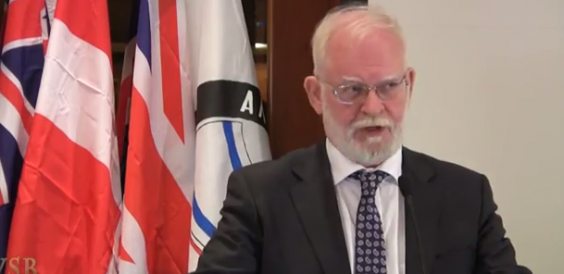Freedom of Speech Roundup
by Sampsonia Way / February 16, 2013 / No comments
In the weekly Freedom of Speech Roundup, Sampsonia Way presents some of the week’s top news on freedom of expression, journalists in danger, artists in exile, and banned literature.

Lars Hedegaard, head of the Denmark Free Press Society, speaks at the Stop Islamization of Nations' International Freedom Defense Council in September 2012. Photo: Pamela Geller via YouTube.
“I may be killed if I write this”: Lars Hedegaard, Founder of Denmark’s Free Press Society
The Spectator. An unknown assailant attacked Lars Hedegaard, a journalist and the leader of the Denmark Free Press Society, at his home in Denmark. In this first-hand account of the incident, Hedegaard also talks about past attacks on various artists and journalists who have written about Islam as well as the hate speech charges he has faced as a result of his work. Read here.
Mexican Media Must Self-Censor To Survive
Committee to Protect Journalists. In Zacatecas, Mexico, drug cartels control the police, politicians, and now the press corps. Journalists, despite knowing the extent of corruption in the state, cannot report on it for fear of being killed. Newspapers are forced to self-censor themselves; asking too many questions ends in death threats. Read here.
Interview: Chinese Blogger Heads Grassroots Revolution
New York Review of Books. Huang Qi, founder of China’s first human rights website, describes the grassroots revolution slowly taking hold in the country in a one-on-one interview. His website, Liusi Tianwang, is almost completely user-generated from citizens calling in reports of human rights violations. Read here.
Nigerian Police Charge Journalists for Inciting Murders of Polio Workers
The Guardian. In northern Nigeria, police have arrested three radio journalists, alleging that they instigated the killings of nine women who were shot while administering polio vaccines. In the days before the attack, several journalists were arrested after discussing the vaccine and its benefits. This is a continuation of the frequent attacks on the press in Nigeria, where ‘simply taking photographs on the street can get a person arrested’. Read here.
Uganda Deports British Producer Who Staged Gay-Themed Play
The Washington Post. David Cecil, an English producer, has been deported from Uganda for “gay themes” in a play titled The River and the Mountain. Cecil was charged with “disobeying lawful orders” and is considered an “undesirable” foreigner. The play comments on a recent bill in Uganda that will raise penalties against open homosexuals in the country. Read here.
Beau Hopkins, the writer of “The River and the Mountain”, discusses in an August 2012 BBC interview that he felt pressure from the press to admit the potential dangers in putting on the play. Video: David Cecil via Youtube.
Netizen Report: Censorship Edition
Global Voices Online. A report on net-censorship across the globe includes website bans in Egypt, Pakistan, and Russia; excessive surveillance techniques in the United Kingdom, arrests due to political criticism in China, Vietnam, and Palestine; plus other concerns surrounding internet privacy, security and copyright laws. Read here.
Egypt: The Future of Freedom of Speech In An Islamist Democracy; YouTube Ban Occurs After Controversy Surrounding Anti-Islam Film
Boston Globe. Egypt’s climate of free speech has improved over the last decade, and while many have been able to criticize the government like never before, many citizens face heavy persecution from President Morsi and the Muslim Brotherhood. While Egyptian government is less constricting than several of their Middle Eastern neighbors, many struggle to find their voice amidst the political unrest. Read here.
The Huffington Post. A court in Cairo has ordered YouTube to be banned for a month for carrying the controversial film Innocence of Muslims. Egypt’s new constitution includes a ban on insulting “religious messengers and prophets.” There is an option to appeal the ruling, and many citizens are criticizing the government’s misunderstanding of the Internet. Read here.
Iran Begins Election Season Web Crackdown A Few Months Early
The Atlantic. In anticipation of its national election in the upcoming months, Iranian officials have began to censor Internet content and have made it a crime to call for an election boycott, organize protests, or otherwise insult or slander political candidates. Additionally, promoting blocked websites or linking to various social media networks like Facebook and Twitter has become a criminal offense. Read here.
As More Movies and Books Are Banned, India’s Free Speech Shrivels
The New York Times. Ranking 140th out of 179 countries in the Reporters Without Borders Press Freedom Index, India has increased its free speech restrictions on social media, books, and movies. In this opinion piece, the author argues that India can never be a cultural capital of the world, or even a free society, until it protects the right to free speech. Read here.




